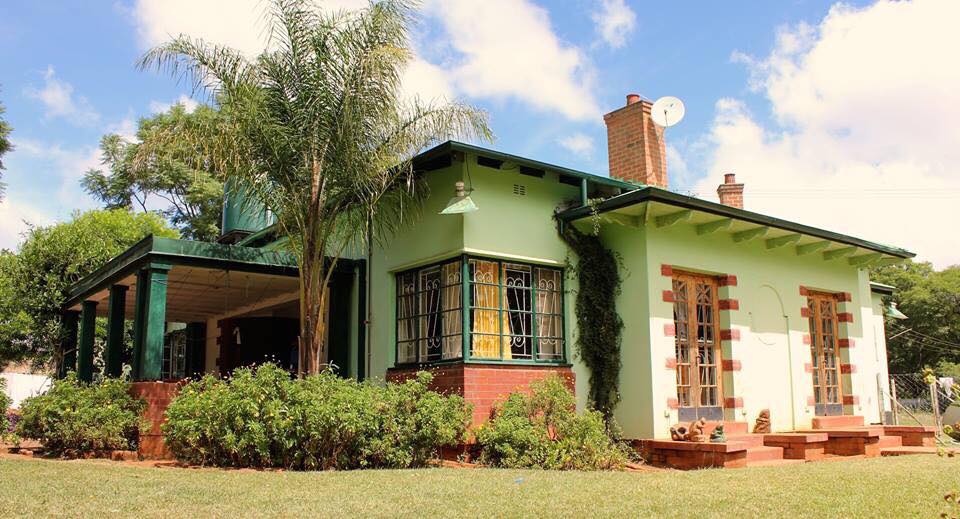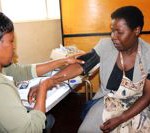The vision is to show Christ’s love to people in need, specifically offering support, assistance, empowerment and *discipleship. Beginning in 2003, we seek to love individuals and families who are living in terribly difficult and disadvantaged circumstances. There are seven key ways we assist people:
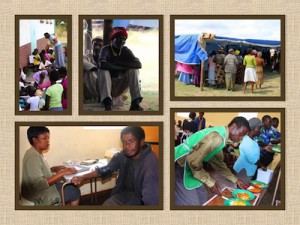
Soup Kitchen – Food Assistance
Empowerment Projects
Health Information Service
Individual and Family Assistance
Community Outreach
HIV Support Groups
Discipleship
Our Neighbours seeks to show Christ’s love to people in need, specifically offering support, assistance, empowerment and *discipleship (where desired). Beginning in 2003 we sought to love individuals and families with a focus on the poorest of the poor in Bulawayo, Zimbabwe. There are numerous parts to Our Neighbours as outlined below.
Individual and Family Support and Assistance
We believe that God’s call is for us to not only run ‘programs’ but to love individuals as He would have us. We get to know people, offering a listening ear and emotional support, as well as assess their situations to see if we can/should assist in material ways. We support and assist people who are homeless, those living in squatter camps, the elderly, those with a mental illness, orphans and the sick.
Given the current circumstances in Zimbabwe there are numerous situations where there is a need for ‘relief’ assistance with the basics like food, medication, hospital/clinic fees, educational costs, accommodation, clothing and transport. We also provide information, referrals, and counselling.
However, ultimately our aim is to empower people to meet their own needs and to share God’s love for them. We assist individuals with small business capital and where people would like *discipleship. We also provide a rehabilitating environment for people. Approximately 60 people are assisted through this part of the ministry per month.
Where material assistance is deemed to be appropriate we categorise situations into ‘once off assistance’, ‘case management’ or ‘long term assistance’. Our long term assistance is only for people who we feel this is necessary, primarily the elderly widows and those who have a mental illness and no family support. There are 80 people/families that we are currently assisting on a long-term basis and as part of this we assist them either daily or monthly with food packs.
Empowerment Projects
This project’s vision is to assist people to run successful small businesses and to provide training to enable this.
Sometimes we assist initially with the management of these small business projects to give people experience and training before becoming less involved over time and ultimately handing the business completely over to them, enabling us to start this process again with another group. On other occasions we provide training for people before facilitating small business loans for them.
Over the years we felt the need to develop this ‘model of empowerment’ given that most of the people we are seeking to assist have little to no small business experience.
Previously we have run this program with 7 people making and selling soap and candles.
Recently, after attending training for 3 months, 15 people were assisted with differing loans depending on individual assessment.
Our most recent empowerment project provided a group of previously unemployed persons training in Appropriate Paper-Based Technology (APT). APT is a process whereby recycled cardboard and paper is used to create basic furniture and useful household items.
Soup Kitchen – Food Assistance
 For many years we have run a ‘Soup Kitchen’, a free nutritional lunch for people, particularly those who are homeless, unemployed and those who live in local squatter camps. This is provided every Tuesday and Friday.
For many years we have run a ‘Soup Kitchen’, a free nutritional lunch for people, particularly those who are homeless, unemployed and those who live in local squatter camps. This is provided every Tuesday and Friday.
This year we have started a time of fellowship before lunch, in response to the vision we felt God gave us for Soup Kitchen for 2010, being “loving relationships that point people to Christ.” A time of worship and sharing is available for those who wish to participate in this after the meal.
The Soup Kitchen is run mainly by ‘regular volunteers’. They work hand in hand preparing meals for approximately 180 people twice a week.
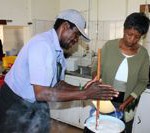 Unicef reported in April 2010, “currently, approximately 78% of the population of Zimbabwe is absolutely poor, and 55% live below the food poverty line”. This gives you an indication of the situation in the country. You can imagine how the most disadvantaged people in the community are struggling to survive.
Unicef reported in April 2010, “currently, approximately 78% of the population of Zimbabwe is absolutely poor, and 55% live below the food poverty line”. This gives you an indication of the situation in the country. You can imagine how the most disadvantaged people in the community are struggling to survive.
In addition to the ‘Soup Kitchen’, there are particular occasions where we feel the need to assist groups or vulnerable individuals with food parcels.
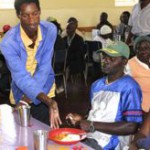
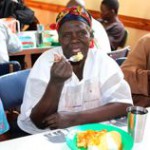

Health Information Service
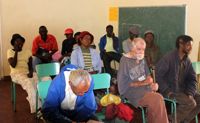 As the desperate medical needs of the people we were assisting became increasingly obvious, we were blessed with people coming forward to assist in this area. The Health Information Service which now operates once a week assists people with quality medical assessment and advice, basic medication and referral to both doctors and hospitals as required.
As the desperate medical needs of the people we were assisting became increasingly obvious, we were blessed with people coming forward to assist in this area. The Health Information Service which now operates once a week assists people with quality medical assessment and advice, basic medication and referral to both doctors and hospitals as required.
Approximately 100 people are assisted per month where we are able to provide holistic based care. We have organised for an HIV testing centre to come to the church once a month for free testing and counselling.
Not only does the Health Information Service provide free medical assistance to people who otherwise can’t even afford the public health options available, it provides a high quality of medical care and treatment. It is run by 2 very experienced nursing sisters, and ably assisted by other health professionals. God is good.
Our team also works hand-in-hand with a Mobile Health Centre which reaches out to other vulnerable communities.
*Discipleship
God is the reason for these ministries and His love is the heart of them. To Him be the glory. We want people to know this and to know God.
In order to *disciple people who want to get to know Him we have the weekly home church meetings after Soup Kitchen and a Bible Study at the Our Neighbours Office once a month with fellowship, teaching, worship, prayer and sharing.
We are looking to start home fellowship/bible study group in the Trenance and Mazwi communities.
HIV/Aids Support Groups
In previous years we ran a number of HIV/Aids Support Groups and assisted in the establishment of others, particularly in various prisons. In 2010 we felt that the season for us running many of these had come to an end for various reasons, though some of these groups continue to meet in the communities.
We now hold a combined HIV/Aids support group once per month, whilst referring those who would want this more regularly to other support groups. The idea of these support groups is to provide an environment for information, sharing and support.
Community Outreach
Trenance Squatter Camp
In early 2009 an outreach programme was started to assist people living in squatter camps in the Trenance community. In these squatter camps approximately 70% of the people are living with HIV and their shacks are constructed from whatever material they can find, including plastic sheeting, pieces of asbestos and tin.
The conditions in which these people live are very poor and in late 2009 we felt God leading us to facilitate churches and other ministries assisting this community to come together, so we can work together better and ultimately better assist the 2 squatter camp communities living in Trenance. It’s been awesome to see God working through this unity of purpose.
We have assisted this community in numerous ways since our involvement began; including water sanitation and some community advocacy. We provide outreach to this community once per week and facilitate a Bible study and children’s program, as well as doing home visits and other involvement at various times. However, probably what is of most significance is that as we have built relationships with this community and there has been much opportunity for us to love, support and assist the people we have come to know. This includes some of the children attending Lighthouse Christian Academy, some of the adults being part of our empowerment projects, regular food assistance to the most vulnerable families, stepping in and helping children who are victims of abuse, helping to facilitate and being part of mobile health clinics going to this community and just being with and loving people in the most difficult of times. We desire for this outreach to be community driven and empowered.
We are concurrently facilitating community meetings etc where we seek to empower these communities to advocate for themselves. We have had a number of possible ‘open doors’ for significant assistance to be given to this community, but we want to ensure that we just have a facilitation/assistance role and that the process is community driven. We are excited by what God may do through this process.
Mazwi
Towards the end of 2012, a relocation plan was put in progress for some of the people living in the Trenance Squatter Community to an area known as St. Peters. Access to basic services is limited, there is a primary school in the area and the secondary school is under construction. Over the last few months we have seen development taking place in the building of two roomed concrete block and plaster shelters with tin roofing.
As a new outreach programme, we desire to reach out to this community in a similar way to that of Trenance, empowering them as much as possible whilst providing support and assisting with basic needs as is deemed necessary. One of the key ways in which HOL felt led to assist this community thus far has been the provision of food during what´s been an incredibly difficult ‘transitional period’ for the people relocated.
Prisons
The Prison Fellowship of Zimbabwe runs an outreach programme in 4 prisons in and around Bulawayo. Our primary assistance in this outreach was to facilitate the start of HIV/Aids support groups within the prisons, offering counselling, information and support.
Unfortunately numerous prisoners are released from prison when their health has deteriorated to shocking levels due to the horrific situations in the prisons and we assist them through our Health Information Service. We are sometimes called to assist people in remand prison who have no relatives to provide for them.
